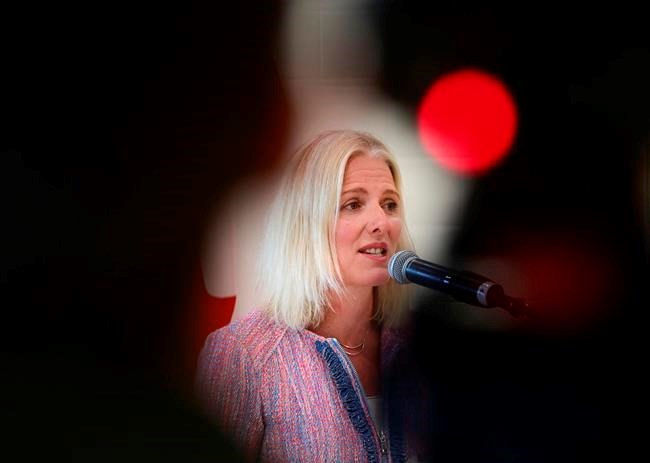OTTAWA — The federal government is moving ahead with plans to help provinces and territories shore up their defences against COVID-19 by freeing up billions of dollars to make schools and hospitals more pandemic resistant and expand outdoor public spaces.
Infrastructure Minister Catherine McKenna unveiled details of the plan Wednesday, which followed weeks of talks between Ottawa and provincial and territorial governments — as well as years of criticism about the slow pace of the Liberals' infrastructure spending.
More than $3.3 billion out of the $33 billion that the Liberal government has previously promised in matching funds for provincial and territorial projects will be available for projects related to the pandemic that are ready to move quickly.
The federal government is envisioning the money will be used to retrofit schools, hospitals and long-term care facilities to better limit the spread of the novel coronavirus, as well as build more bike lanes and walking paths for people to get outside.
Provinces and territories will also be able to use the money to shore up their protections against other disasters such as floods and wildfires. Provincial projects need to be finished by 2021. The territories will have an extra year.
The maximum cost for any single project is $10 million.
To get things moving faster, McKenna said Ottawa is streamlining the process for provinces and territories to submit projects for funding. It will also cover 80 per cent of the cost of eligible projects submitted by provinces, and the full cost from the territories.
Normally, Ottawa would cover one-third of the cost of municipal projects, half the cost of provincial projects and 75 per cent of the cost in Northwest Territories, Nunavut and Yukon.
The goal is "to help address the pandemic, to make communities more resilient, to work on keeping kids and aging parents and all of us safer and also to improve the quality of life," McKenna said during a news conference at the Boys and Girls Club of Ottawa.
"We will be speeding up project approvals. We will be opening up new projects eligible for funding. ... And recognizing the challenging financial situation for municipalities and provinces, we'll be offering a bigger federal share."
The new approach comes as most governments across the country are looking at reopening schools in the next month and trying to better protect nursing homes and other facilities from new outbreaks of COVID-19.
At the same time, many provincial and municipal governments are facing significant financial pressure due to the pandemic, which has caused severe economic damage and uncertainty in local communities.
The federal government has promised billions of dollars in stimulus funding, though McKenna acknowledged the infrastructure funds in question on Wednesday had been previously announced.
McKenna underscored that as the country adapts to COVID-19, "every taxpayer dollar we invest, needs to do triple duty.
"It needs to keep Canadians healthy and safe by making communities more resilient. It needs to create jobs and create economic stability. And it needs to tackle the big challenges we have, like climate change and inequality."
Ottawa will now have to sign agreements with the provinces and territories modifying the terms of the previous infrastructure-funding arrangements.
The new rush to get money out the door during COVID-19 follows the Liberals having been criticized in recent years for being slow to get their massive infrastructure programs moving.
Disagreements and tensions between many provincial governments and Ottawa kept some projects from going ahead. The parliamentary budget office has issued several reports outlining the sloth-like pace of project approvals and complex nature of the arrangements.
Opposition parties in the House of Commons joined forces in January to pass a motion asking for an official audit of the Investing in Canada program, which overall committed more than $180 billion across more than a decade to infrastructure programs.
The Federation of Canadian Municipalities, which represents communities across the country, welcomed the new measure as reflective of the concerns they have raised about getting more federal infrastructure money out the door faster.
"The federal government has heard us and also believes that supporting local action with more flexibility in funding, more efficient approvals and higher federal contributions will help municipal leaders across the country get projects out the door faster," FCM president Bill Karsten said in a statement.
"We are urging provinces and territories to work with municipalities as they consider whether or not to opt in to this new funding stream. Collaboration amongst all governments will be key to delivering concrete results for Canadians on the ground and essential to Canada's economic recovery."
This report by The Canadian Press was first published Aug. 5, 2020.
Lee Berthiaume, The Canadian Press
